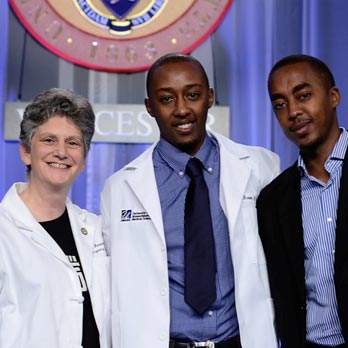 |
|
| Robert Gakwaya (center), received his white coat during Convocation 2011. Here he poses with mentor Joyce Rosenfeld and his brother Chris, who traveled from Rwanda to participate in the event. | |
To fellow Rwandans who also lived through the tiny African country’s infamous genocide of 1994, first-year School of Medicine student Robert Gakwaya’s story is a familiar one. But for his acquaintances in the United States who can only imagine what he experienced, Gakwaya’s story offers lessons about his native culture’s enduring emphasis on community ties and extended family, despite unthinkable violence. These principles guide him at the same time that he continues to adapt to life in his adopted country.
Barely a teen when he fled to a refugee camp with the family that had hidden him for the previous three months, Gakwaya was well aware of the fact that he could be killed at any time by the men with machetes roaming around the camp. Within days, cholera was killing refugees by the hundreds.
“With death hovering over me, I came to realize how fragile life can be,” Gakwaya wrote in his application to medical school. “I look at my life as a second chance given to fulfill a purpose. The purpose I chose is saving and preserving lives wherever and whenever I can.”
Living in a developing country where the health care system lacks qualified personnel, and a treatable disease—malaria—remains the leading cause of death, also made him realize how valuable physicians are. “A great number of these deaths, I believe, were preventable,” he noted. “This will take more than me as a physician to solve, but I profoundly aspire to help.”
Eventually able to return with his family to his hometown of Butare, Gakwaya worked as a peer educator after graduating from high school. In this job, he taught young people aged 15 to 24 years old in the rural areas of Rwanda about HIV/AIDS, STDs, unplanned pregnancies and malaria. “It was very satisfying to know that, at the end of the day, the conversations we had positively impacted their lives,” he recalled.
Once in the United States, one of his jobs was as a personal care assistantfor patients with cerebral palsy. “As challenging as this could be, it was rewarding to know that I could put myself in uncomfortable situations to make another person a little more comfortable,” he reflected. “Both of these experiences further inspired me to pursue a path to medical school.”
His sights were set on Massachusetts for its renowned universities when, in 2004, Gakwaya won a green card allowing him to permanently immigrate to the United States. Living in Boston with his sponsors, Gakwaya at first worked at whatever jobs he could get. Eventually he was able to enroll at UMass Boston, where he earned a degree in chemistry. After working three more years and becoming an American citizen, Gakwaya is now at UMass Medical School, fulfilling the dream shaped by his formative experiences in Rwanda.
His path has been challenging, but one well worth taking. “On top of working an overnight shift while going to school, I had to study in a new language, as my education up to that point had been done in French. Outside of school, I had to adjust to a new culture,” Gakwaya said of his time at UMass Boston. “Still today, with a positive attitude despite the odds, I feel more firmly than ever my entrenched desire to become a physician.”
He said he owes much of his determination to the example set by his mother, who has seen all six of her children graduate from college, and earned her own degree in clinical psychology at age 54. “Ethnic and gender discrimination did not discourage my mother from pursuing her dreams,” Gakwaya wrote. “As she always told me, challenges should not be seen as setbacks but opportunities to learn.”
Despite being thousands miles away from family and friends in Rwanda, he has never felt alone. “I have been welcomed in many families as one of their own, including my mentor’s family,” he said, referring to his UMMS Learning Community mentor, Joyce Rosenfeld, MD, associate professor of emergency medicine. “Many Americans and Rwandans living in the United States have provided me with the support I needed to get through undergraduate and the medical school application process.”
While still early in his medical training, Gakwaya is contemplating a future as a global physician working in both of his countries, focusing on public health and, perhaps, pediatrics. Attracted to the Medical School by its emphasis on public health, he hopes to earn a master of public health degree in addition to his BS and MD degrees from the UMass system. “I personally feel the obligation to give back both to the great state of Massachusetts that has given me quality education through its public university, and to my native country where I would be glad to contribute to the tremendous progress taking place currently.”
At the request of Dr. Rosenfeld, whose son is a seventh grader at Oak Middle School in Shrewsbury, Gakwaya recently spoke there about his life in Africa and the progress that has occurred in Rwanda since its worst days. What began as a simple favor became a cross-cultural encounter that was edifying as well as fun for both him and the kids. “It was a learning experience for all of us,” Gakwaya said with a grin.
Related links on UMassMedNow:
Learning Communities mentors make a personal connection with students
First-year medical students urged to view white coats as ‘an opportunity to reveal your compassion’